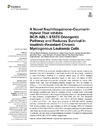Identificador persistente para citar o vincular este elemento:
https://accedacris.ulpgc.es/jspui/handle/10553/69815
| Título: | A novel naphthoquinone-coumarin hybrid that inhibits BCR-ABL1-STAT5 oncogenic pathway and reduces survival in imatinib-resistant chronic myelogenous leukemia cells | Autores/as: | Martín-Rodríguez, Patricia Guerra, Borja Hueso-Falcón, Idaira Aranda Tavío, Haidee Magdalena Díaz-Chico, Juan Quintana Aguiar, José Martín Estévez, Francisco Díaz-Chico, Bonifacio Amesty, Angel Estévez-Braun, Ana Fernández-Pérez, Leandro |
Clasificación UNESCO: | 320101 Oncología 3209 Farmacología |
Palabras clave: | Bcr-Abl1 Coumarin Drug Resistance Imatinib Leukemia, et al. |
Fecha de publicación: | 2019 | Proyectos: | Desarrollo Preclínico de Nuevas Estructuras Bioactivas Moduladoras de Las Actividades Oncogénicas de Stat3/5 O de Los Receptores de Estrógenos Desarrollo Preclínico de Nuevas Estructuras Bioactivas Moduladoras de Las Actividades Oncogénicas de Stat3/5 O de Los Receptores de Estrógenos |
Publicación seriada: | Frontiers in Pharmacology | Resumen: | This is an open-access article distributed under the terms of the Creative Commons Attribution License (CC BY). BCR-ABL1-STAT5 is an oncogenic signaling pathway in human chronic myelogenous leukemia (CML) and it represents a valid target for anti-CML drug design. Resistance to direct BCR-ABL1 inhibitors is a common clinical issue, so STAT5 inhibition has become an interesting alternative target. In this study, the effects of NPQ-C6, a novel naphtoquinone-coumarin conjugate, were evaluated on human CML-derived K562 cells. Live-Cell Imaging analysis revealed that NPQ-C6 inhibited 2D (IC50AUC = 1.4 ± 0.6 μM) growth of CML cells. NPQ-C6 increased sub-G1 and reduced G0/G1 cell cycle phases in a dose- and time-dependent manner. This effect on cell cycle was related to increased levels of apoptotic nuclei, cleavage of caspase-3, -9, and PARP and annexin V-positive cells. NPQ-C6 increased γH2AX, a double-strand DNA break marker. NPQ-C6 showed a wide range of modulatory effects on cell signaling through an early increased phosphorylation of JNK, P38-MAPK and AKT, and decreased phosphorylation of ERK1/2, BCR-ABL1, and STAT5. NPQ-C6 inhibited expression of c-MYC and PYM-1, two target gene products of BCR-ABL1/STAT5 signaling pathway. Cytokine-induced activation of STAT5/STAT3-dependent transcriptional and DNA binding activities were also inhibited by NPQ-C6. Notably, NPQ-C6 maintained its activity on BCR-ABL1/STAT5/c-MYC/PIM-1 oncogenic pathway in imatinib-resistant cells. Molecular modeling suggested BCR-ABL1 and JAK2 proteins as NPQ-C6 targets. In summary, our data show a novel multikinase modulator that might be therapeutically effective in BCR-ABL1-STAT5-related malignancies. | URI: | https://accedacris.ulpgc.es/handle/10553/69815 | ISSN: | 1663-9812 | DOI: | 10.3389/fphar.2018.01546 | Fuente: | Frontiers In Pharmacology [ISSN 1663-9812], v. 9, (Enero 2019) |
| Colección: | Artículos |
Citas SCOPUSTM
10
actualizado el 08-jun-2025
Citas de WEB OF SCIENCETM
Citations
10
actualizado el 22-feb-2026
Visitas 5
95
actualizado el 10-ene-2026
Descargas
73
actualizado el 10-ene-2026
Google ScholarTM
Verifica
Altmetric
Comparte
Exporta metadatos
Los elementos en ULPGC accedaCRIS están protegidos por derechos de autor con todos los derechos reservados, a menos que se indique lo contrario.
